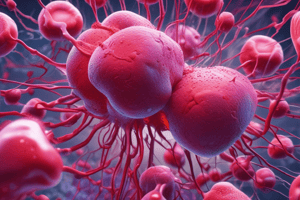Podcast
Questions and Answers
Are antigens found on the surface of cells?
Are antigens found on the surface of cells?
True (A)
What is the purpose of antigens?
What is the purpose of antigens?
- Kill other cells
- Help the cell move through it's environment
- Identify the cell (correct)
- Aid in metabolism
Self-antigens are molecules found inside of our own cells
Self-antigens are molecules found inside of our own cells
False (B)
What is the purpose of self-antigens?
What is the purpose of self-antigens?
What kinds of molecules typically act as antigens?
What kinds of molecules typically act as antigens?
Antigens are detected by Lymphocytes
Antigens are detected by Lymphocytes
How do immune cells detect antigens?
How do immune cells detect antigens?
What are APC's?
What are APC's?
What is the role of APC's?
What is the role of APC's?
How many different antigens can a single Lymphocyte detect?
How many different antigens can a single Lymphocyte detect?
Study Notes
Antigens and Immune Response
- Antigens are found on the surface of cells.
- The purpose of antigens is to stimulate an immune response.
Self-Antigens
- Self-antigens are molecules found inside of our own cells.
- The purpose of self-antigens is to help the immune system distinguish between the body's own cells and foreign substances.
Types of Antigens
- Proteins, peptides, and polysaccharides are typical molecules that act as antigens.
Antigen Detection
- Antigens are detected by Lymphocytes, a type of immune cell.
- Immune cells detect antigens through the recognition of specific molecular structures on the antigen's surface.
Antigen-Presenting Cells (APCs)
- Antigen-Presenting Cells (APCs) are immune cells that process and display antigens on their surface.
- The role of APCs is to present antigens to Lymphocytes, triggering an immune response.
Lymphocyte-Antigen Interaction
- A single Lymphocyte can detect multiple antigens, but the exact number is not fixed.
Studying That Suits You
Use AI to generate personalized quizzes and flashcards to suit your learning preferences.




